formerly eScholarship Editions


|
|
|
|
Your search for
'European Studies' in subject
found 58 book(s). | Modify Search | Displaying 41 - 58 of 58 book(s) | |
| 41. | 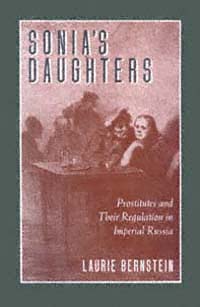 | Title: Sonia's daughters: prostitutes and their regulation in imperial Russia Author: Bernstein, Laurie Published: University of California Press, 1995 Subjects: History | European History | European Studies | Women's Studies | Russian and Eastern European Studies Publisher's Description: Prostitution in Imperial Russia was so tenacious that it survived not only the tsarist regime's most tumultuous years but the Bolshevik revolution itself. Laurie Bernstein's comprehensive study is the first to look at how the state and society responded to the issue of prostitution - the attitudes of prostitutes themselves, state regulation, societal reactions, and attempts at reform. She finds that prostitution and its regulation were integral to Russia's structures of gender, class, and politics.The first historian from outside the former Soviet Union to be granted access to these archival materials on prostitution, Bernstein takes the reader to the streets of Russia's cities, to the state-licensed brothels, medical clinics, hospital wards, halfway houses for "fallen women," and to the highest circles of the tsarist administration. [brief] Similar Items |
| 42. | 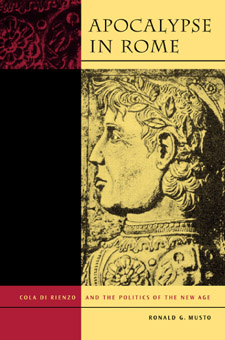 | Title: Apocalypse in Rome: Cola di Rienzo and the politics of the New Age Author: Musto, Ronald G Published: University of California Press, 2003 Subjects: History | European Studies | Medieval History | Medieval Studies | Autobiographies and Biographies | Classical Politics | Autobiographies and Biographies Publisher's Description: On May 20, 1347, Cola di Rienzo overthrew without violence the turbulent rule of Rome's barons and the absentee popes. A young visionary and the best political speaker of his time, Cola promised Rome a return to its former greatness. Ronald G. Musto's vivid biography of this charismatic leader - whose exploits have enlivened the work of poets, composers, and dramatists, as well as historians - peels away centuries of interpretation to reveal the realities of fourteenth-century Italy and to offer a comprehensive account of Cola's rise and fall. A man of modest origins, Cola gained a reputation as a talented professional with an unparalleled knowledge of Rome's classical remains. After earning the respect and friendship of Petrarch and the sponsorship of Pope Clement VI, Cola won the affections and loyalties of all classes of Romans. His buono stato established the reputation of Rome as the heralded New Jerusalem of the Apocalypse and quickly made the city a potent diplomatic and religious center that challenged the authority - and power - of both pope and emperor. At the height of Cola's rule, a conspiracy of pope and barons forced him to flee the city and live for years as a fugitive until he was betrayed and taken to Avignon to stand trial as a heretic. Musto relates the dramatic story of Cola's subsequent exoneration and return to central Italy as an agent of the new pope. But only weeks after he reestablished his government, he was slain by the Romans atop the Capitoline hill. In his exploration, Musto examines every known document pertaining to Cola's life, including papal, private, and diplomatic correspondence rarely used by earlier historians. With his intimate knowledge of historical Rome - its streets and ruins, its churches and palaces, from the busy Tiber riverfront to the lost splendor of the Capitoline - he brings a cinematic flair to this fascinating historical narrative. [brief] Similar Items |
| 43. | 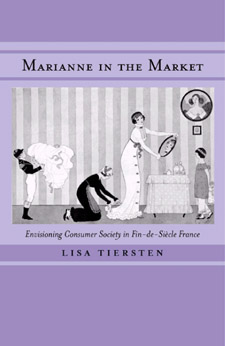 | Title: Marianne in the market: envisioning consumer society in fin-de-siècle France Author: Tiersten, Lisa 1959- Published: University of California Press, 2001 Subjects: European Studies | European History | Consumerism | French Studies | Women's Studies Publisher's Description: In the late nineteenth century, controversy over the social ramifications of the emerging consumer marketplace beset the industrialized nations of the West. In France, various commentators expressed concern that rampant commercialization threatened the republican ideal of civic-mindedness as well as the French reputation for good taste. The female bourgeois consumer was a particularly charged figure because she represented consumption run amok. Critics feared that the marketplace compromised her morality and aesthetic discernment, with dire repercussions for domestic life and public order. Marianne in the Market traces debates about the woman consumer to examine the complex encounter between the market and the republic in nineteenth-century France. It explores how agents of capitalism - advertisers, department store managers, fashion journalists, self-styled taste experts - addressed fears of consumerism through the forging of an aesthetics of the marketplace: a "marketplace modernism." In so doing, they constructed an image of the bourgeois woman as the solution to the problem of unrestrained, individualized, and irrational consumption. Commercial professionals used taste to civilize the market and to produce consumers who would preserve the French aesthetic patrimony. Tasteful consumption legitimized women's presence in the urban public and reconciled their roles as consumers with their domestic and civic responsibilities. A fascinating case study, Marianne in the Market builds on a wide range of sources such as the feminine press, decorating handbooks, exposition reports, advertising materials, novels, and etiquette books. Lisa Tiersten draws on these materials to make the compelling argument that market professionals used the allure of aesthetically informed consumerism to promote new models of the female consumer and the market in keeping with Republican ideals. [brief] Similar Items |
| 44. |  | Title: Medieval stereotypes and modern antisemitism Author: Chazan, Robert Published: University of California Press, 1997 Subjects: Medieval Studies | Jewish Studies | Medieval History | European History | European Studies Publisher's Description: The twelfth century in Europe, hailed by historians as a time of intellectual and spiritual vitality, had a dark side. As Robert Chazan points out, the marginalization of minorities emerged during the "twelfth-century renaissance" as part of a growing pattern of persecution, and among those stigmatized the Jews figured prominently.The migration of Jews to northern Europe in the late tenth century led to the development of a new set of Jewish communities. This northern Jewry prospered, only to decline sharply two centuries later. Chazan locates the cause of the decline primarily in the creation of new, negative images of Jews. He shows how these damaging twelfth-century stereotypes developed and goes on to chart the powerful, lasting role of the new anti-Jewish imagery in the historical development of antisemitism.This coupling of the twelfth century's notable intellectual bequests to the growth of Western civilization with its legacy of virulent anti-Jewish motifs offers an important new key to understanding modern antisemitism. [brief] Similar Items |
| 45. |  | Title: Transforming settler states: communal conflict and internal security in Northern Ireland and Zimbabwe Author: Weitzer, Ronald John Published: University of California Press, 1990 Subjects: European Studies | Politics | Sociology | African Studies | European History Publisher's Description: In the past two decades, several settler regimes have collapsed and others seem increasingly vulnerable. This study examines the rise and demise of two settler states with particular emphasis on the role of repressive institutions of law and order. Drawing on field research in Northern Ireland and Zimbabwe, Ronald Weitzer traces developments in internal security structures before and after major political transitions. He concludes that thoroughgoing transformation of a repressive security apparatus seems to be an essential, but often overlooked, precondition for genuine democracy.In an instructive comparative analysis, Weitzer points out the divergent development of initially similar governmental systems. For instance, since independence in 1980, the government of Zimbabwe has retained and fortified basic features of the legal and organizational machinery of control inherited from the white Rhodesian state, and has used this apparatus to neutralize obstacles to the installation of a one-party state. In contrast, though liberalization is far from complete. The British government has succeeded in reforming important features of the old security system since the abrupt termination of Protestant, Unionist rule in Northern Ireland in 1972. The study makes a novel contribution to the scholarly literature on transitions from authoritarianism to democracy in its fresh emphasis on the pivotal role of police, military, and intelligence agencies in shaping political developments. [brief] Similar Items |
| 46. | 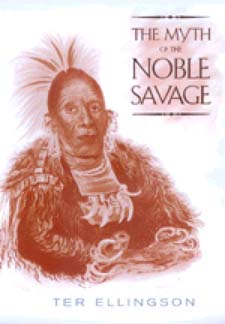 | Title: The myth of the noble savage Author: Ellingson, Terry Jay Published: University of California Press, 2001 Subjects: Anthropology | Cultural Anthropology | Intellectual History | European History | American Studies | European Studies | Postcolonial Studies Publisher's Description: In this important and original study, the myth of the Noble Savage is an altogether different myth from the one defended or debunked by others over the years. That the concept of the Noble Savage was first invented by Rousseau in the mid-eighteenth century in order to glorify the "natural" life is easily refuted. The myth that persists is that there was ever, at any time, widespread belief in the nobility of savages. The fact is, as Ter Ellingson shows, the humanist eighteenth century actually avoided the term because of its association with the feudalist-colonialist mentality that had spawned it 150 years earlier. The Noble Savage reappeared in the mid-nineteenth century, however, when the "myth" was deliberately used to fuel anthropology's oldest and most successful hoax. Ellingson's narrative follows the career of anthropologist John Crawfurd, whose political ambition and racist agenda were well served by his construction of what was manifestly a myth of savage nobility. Generations of anthropologists have accepted the existence of the myth as fact, and Ellingson makes clear the extent to which the misdirection implicit in this circumstance can enter into struggles over human rights and racial equality. His examination of the myth's influence in the late twentieth century, ranging from the World Wide Web to anthropological debates and political confrontations, rounds out this fascinating study. [brief] Similar Items |
| 47. | 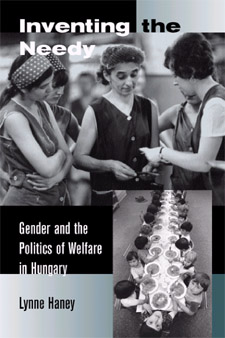 | Title: Inventing the needy: gender and the politics of welfare in Hungary Author: Haney, Lynne A. (Lynne Allison) 1967- Published: University of California Press, 2002 Subjects: Sociology | European Studies | European History | Gender Studies | Law | Social Problems | Political Theory | Russian and Eastern European Studies | Sociology | Sociology Publisher's Description: Inventing the Needy offers a powerful, innovative analysis of welfare policies and practices in Hungary from 1948 to the last decade of the twentieth century. Using a compelling mix of archival, interview, and ethnographic data, Lynne Haney shows that three distinct welfare regimes succeeded one another during that period and that they were based on divergent conceptions of need. The welfare society of 1948-1968 targeted social institutions, the maternalist welfare state of 1968-1985 targeted social groups, and the liberal welfare state of 1985-1996 targeted impoverished individuals. Because they reflected contrasting conceptions of gender and of state-recognized identities, these three regimes resulted in dramatically different lived experiences of welfare. Haney's approach bridges the gaps in scholarship that frequently separate past and present, ideology and reality, and state policies and local practices. A wealth of case histories gleaned from the archives of welfare institutions brings to life the interactions between caseworkers and clients and the ways they changed over time. In one of her most provocative findings, Haney argues that female clients' ability to use the state to protect themselves in everyday life diminished over the fifty-year period. As the welfare system moved away from linking entitlement to clients' social contributions and toward their material deprivation, the welfare system, and those associated with it, became increasingly stigmatized and pathologized. With its focus on shifting inventions of the needy, this broad historical ethnography brings new insights to the study of welfare state theory and politics. [brief] Similar Items |
| 48. | 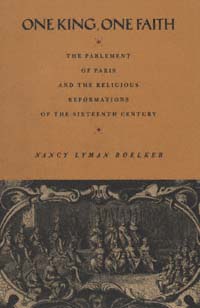 | Title: One king, one faith: the Parlement of Paris and the religious reformations of the sixteenth century Author: Roelker, Nancy L. (Nancy Lyman) Published: University of California Press, 1996 Subjects: History | European History | Christianity | European Studies | French Studies Publisher's Description: This book, the culmination of a lifelong career in French history, tackles head-on the central question of the French Religious Wars: Why did France prove so consistently hostile and resistant to Protestantism? Distinguished scholar Nancy Lyman Roelker claims that what ultimately motivated the passion and violence of the civil wars was religion. She demonstrates that not only the body politic but also the body social was defined by Gallican Catholicism.Roelker underscores the role the Parlement played in shaping and safeguarding the social, as well as the political, order. Her study is based on extensive research in the correspondence, memoirs, and tracts of mainstream Catholic magistrates as well as dissenters. It creates an overview of the mentalitè s of the Parlement, analyzes religious attitudes toward major events of the period, and examines the Parlement's role in the triumph of Henri IV. Along the way, it sheds light on the inner workings of the Parlement and other political institutions, on social structures, and on collective ideas. And above all, this distinguished work brilliantly illuminates the role of religion in society and the state. It will be the definitive work on the subject for many years to come. [brief] Similar Items |
| 49. | 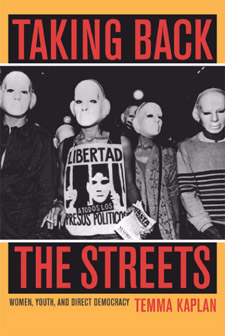 | Title: Taking back the streets: women, youth, and direct democracy Author: Kaplan, Temma 1942- Published: University of California Press, 2004 Subjects: History | Politics | Anthropology | Latin American Studies | European Studies | Women's Studies | Sociology Publisher's Description: Toward the end of the twentieth century in places ranging from Latin America and the Caribbean to Europe, the United States, South Africa, Nigeria, Iran, Japan, China, and South Asia, women and young people took to the streets to fight injustices they believed they could not confront in any other way. In the hope of changing the way politics is done, they called officials to account for atrocities they had committed and unjust laws they had upheld. They attempted to drive authoritarian governments from power by publicizing the activities these officials tried to hide. This powerful book takes us into the midst of these movements to give us a close-up look at how a new generation bore witness to human rights violations, resisted the efforts of regimes to shame and silence young idealists, and created a vibrant public life that remains a vital part of ongoing struggles for democracy and justice today. Through personal interviews, newspaper accounts, family letters, and research in the archives of human rights groups, this book portrays women and young people from Argentina, Chile, and Spain as emblematic of others around the world in their public appeals for direct democracy. An activist herself, author Temma Kaplan gives readers a deep and immediate sense of the sacrifices and accomplishments, the suffering and the power of these uncommon common people. By showing that mobilizations, sometimes accompanied by shaming rituals, were more than episodic - more than ways for societies to protect themselves against government abuses and even state terrorism - her book envisions a creative political sphere, a fifth estate in which ordinary citizens can reorient the political practices of democracy in our time. [brief] Similar Items |
| 50. | 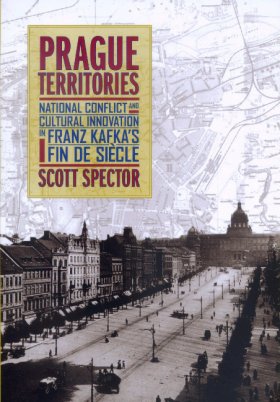 | Title: Prague territories: national conflict and cultural innovation in Franz Kafka's fin de siècle Author: Spector, Scott 1959- Published: University of California Press, 2002 Subjects: History of Food | European History | Jewish Studies | European Studies Publisher's Description: Scott Spector's adventurous cultural history maps for the first time the "territories" carved out by German-Jewish intellectuals living in Prague at the dawn of the twentieth century. Spector explores the social, cultural, and ideological contexts in which Franz Kafka and his contemporaries flourished, revealing previously unseen relationships between politics and culture. His incisive readings of a broad array of German writers feature the work of Kafka and the so-called "Prague circle" and encompass journalism, political theory, Zionism, and translation as well as literary program and practice. With the collapse of German-liberal cultural and political power in the late-nineteenth-century Habsburg Empire, Prague's bourgeois Jews found themselves squeezed between a growing Czech national movement on the one hand and a racial rather than cultural conception of Germanness on the other. Displaced from the central social and cultural position they had come to occupy, the members of the "postliberal" Kafka generation were dazzlingly productive and original, far out of proportion to their numbers. Seeking a relationship between ideological crisis and cultural innovation, Spector observes the emergence of new forms of territoriality. He identifies three fundamental areas of cultural inventiveness related to this Prague circle's political and cultural dilemma. One was Expressionism, a revolt against all limits and boundaries, the second was a spiritual form of Zionism incorporating a novel approach to Jewish identity that seems to have been at odds with the pragmatic establishment of a Jewish state, and the third was a sort of cultural no-man's-land in which translation and mediation took the place of "territory." Spector's investigation of these areas shows that the intensely particular, idiosyncratic experience of German-speaking Jews in Prague allows access to much broader and more general conditions of modernity. Combining theoretical sophistication with a refreshingly original and readable style, Prague Territories illuminates some early signs of a contemporary crisis from which we have not yet emerged. [brief] Similar Items |
| 51. | 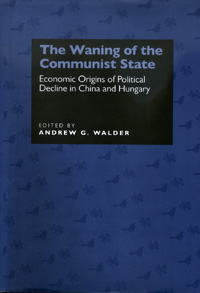 | Title: The waning of the communist state: economic origins of political decline in China and Hungary Author: Walder, Andrew George Published: University of California Press, 1995 Subjects: Politics | Sociology | European History | Asian History | China | European Studies | Economics and Business Publisher's Description: This collection of essays offers a compelling explanation for the decline of communism in the two countries that went the furthest with economic reforms - China and Hungary. Articulating a vision of change that serves as a counterpoint to the prevailing emphasis on citizen resistance and protest, the contributors focus instead on the declining organizational integrity of the centralized party-state. The essays illuminate a "quiet revolution from within" that beset the two regimes after they chose to reform their economies and make concessions to the private sector.The nine contributors, three each from the disciplines of sociology, political science, and anthropology, examine key trends that appeared in both countries. The chapters trace political consequences of economic reform that range from the decline of the central state's fiscal dominance to the revitalization of long-suppressed ethnic loyalties. [brief] Similar Items |
| 52. |  | Title: Frontiers and ghettos: state violence in Serbia and Israel Author: Ron, James Published: University of California Press, 2003 Subjects: Sociology | European Studies | Cultural Anthropology | Ethnic Studies | Christianity | Judaism | Islam | Christianity Publisher's Description: James Ron uses controversial comparisons between Serbia and Israel to present a novel theory of state violence. Formerly a research consultant to Human Rights Watch and the International Red Cross, Ron witnessed remarkably different patterns of state coercion. Frontiers and Ghettos presents an institutional approach to state violence, drawing on Ron's field research in the Middle East, Balkans, Chechnya, Turkey, and Africa, as well as dozens of rare interviews with military veterans, officials, and political activists on all sides. Studying violence from the ground up, the book develops an exciting new framework for analyzing today's nationalist wars. [brief] Similar Items |
| 53. |  | Title: Where are you from?: Middle-class migrants in the modern world Author: Raj, Dhooleka Sarhadi 1969- Published: University of California Press, 2003 Subjects: Anthropology | Cultural Anthropology | Earth Sciences | Postcolonial Studies | Sociology | European Studies | South Asia | Immigration | Sociology | Sociology Publisher's Description: Dhooleka S. Raj explores the complexities of ethnic minority cultural change in this incisive examination of first- and second-generation middle-class South Asian families living in London. Challenging prevalent understandings of ethnicity that equate community, culture, and identity, Raj considers how transnational ethnic minorities are circumscribed by nostalgia for culture. Where Are You From? argues that the nostalgia for culture obscures the complexities of change in migrant minority lives and limits the ways the politics of diversity can be imagined by the nation. Based on ethnographic research with Indian migrants and their children, this book examines how categories of identity, culture, community, and nation are negotiated and often equated. [brief] Similar Items |
| 54. | 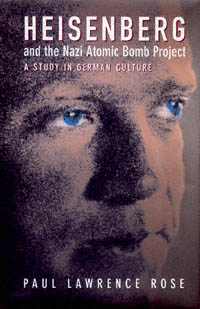 | Title: Heisenberg and the Nazi atomic bomb project: a study in German culture Author: Rose, Paul Lawrence Published: University of California Press, 1998 Subjects: History | European History | German Studies | European Studies | Science | Technology and Society | Physics | History and Philosophy of Science Publisher's Description: No one better represents the plight and the conduct of German intellectuals under Hitler than Werner Heisenberg, whose task it was to build an atomic bomb for Nazi Germany. The controversy surrounding Heisenberg still rages, because of the nature of his work and the regime for which it was undertaken. What precisely did Heisenberg know about the physics of the atomic bomb? How deep was his loyalty to the German government during the Third Reich? Assuming that he had been able to build a bomb, would he have been willing? These questions, the moral and the scientific, are answered by Paul Lawrence Rose with greater accuracy and breadth of documentation than any other historian has yet achieved.Digging deep into the archival record among formerly secret technical reports, Rose establishes that Heisenberg never overcame certain misconceptions about nuclear fission, and as a result the German leaders never pushed for atomic weapons. In fact, Heisenberg never had to face the moral problem of whether he should design a bomb for the Nazi regime. Only when he and his colleagues were interned in England and heard about Hiroshima did Heisenberg realize that his calculations were wrong. He began at once to construct an image of himself as a "pure" scientist who could have built a bomb but chose to work on reactor design instead. This was fiction, as Rose demonstrates: in reality, Heisenberg blindly supported and justified the cause of German victory. The question of why he did, and why he misrepresented himself afterwards, is answered through Rose's subtle analysis of German mentality and the scientists' problems of delusion and self-delusion. This fascinating study is a profound effort to understand one of the twentieth century's great enigmas. [brief] Similar Items |
| 55. |  | Title: Mallarmé's children: symbolism and the renewal of experience Author: Smith, Richard Cándida Published: University of California Press, 2000 Subjects: History | Intellectual History | Art | European Studies | Literature Publisher's Description: In a narrative gracefully combining intellectual and cultural history, Richard Cándida Smith unfolds the legacy of Stéphane Mallarmé (1842-1898), the poet who fathered the symbolist movement in poetry and art. The symbolists found themselves in the midst of the transition to a world in which new media devoured cultural products and delivered them to an ever-growing public. Their goal was to create and oversee a new elite culture, one that elevated poetry by removing it from a direct relationship to experience. Instead, symbolist poetry was dedicated to exploring discourse itself, and its practitioners to understanding how language shapes consciousness.Cándida Smith investigates the intellectual context in which symbolists came to view artistic practice as a form of knowledge. He relates their work to psychology, especially the ideas of William James, and to language and the emergence of semantics. Through the lens of symbolism, he focuses on a variety of subjects: sexual liberation and the erotic, anarchism, utopianism, labor, and women's creative role. Paradoxically, the symbolists' reconfiguration of elite culture fit effectively into the modern commercial media. After Mallarmé was rescued from obscurity, symbolism became a valuable commodity, exported by France to America and elsewhere in the market-driven turn-of-the-century world. Mallarmé's Children traces not only how poets regarded their poetry and artists their art but also how the public learned to think in new ways about cultural work and to behave differently as a result. [brief] Similar Items |
| 56. | 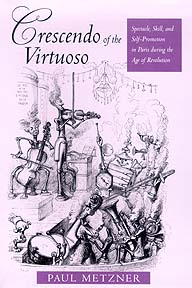 | Title: Crescendo of the virtuoso: spectacle, skill, and self-promotion in Paris during the Age of Revolution Author: Metzner, Paul 1952- Published: University of California Press, 1998 Subjects: History | European History | French Studies | European Studies Publisher's Description: During the Age of Revolution, Paris came alive with wildly popular virtuoso performances. Whether the performers were musicians or chefs, chess players or detectives, these virtuosos transformed their technical skills into dramatic spectacles, presenting the marvelous and the outré for spellbound audiences. Who these characters were, how they attained their fame, and why Paris became the focal point of their activities is the subject of Paul Metzner's absorbing study. Covering the years 1775 to 1850, Metzner describes the careers of a handful of virtuosos: chess masters who played several games at once; a chef who sculpted hundreds of four-foot-tall architectural fantasies in sugar; the first police detective, whose memoirs inspired the invention of the detective story; a violinist who played whole pieces on a single string. He examines these virtuosos as a group in the context of the society that was then the capital of Western civilization. [brief] Similar Items |
| 57. |  | Title: The war come home: disabled veterans in Britain and Germany, 1914-1939 Author: Cohen, Deborah 1968- Published: University of California Press, 2001 Subjects: History | European History | German Studies | Military History | European Studies Publisher's Description: Disabled veterans were the First World War's most conspicuous legacy. Nearly eight million men in Europe returned from the First World War permanently disabled by injury or disease. In The War Come Home, Deborah Cohen offers a comparative analysis of the very different ways in which two belligerent nations--Germany and Britain--cared for their disabled. At the heart of this book is an apparent paradox. Although postwar Germany provided its disabled veterans with generous benefits, they came to despise the state that favored them. Disabled men proved susceptible to the Nazi cause. By contrast, British ex-servicemen remained loyal subjects, though they received only meager material compensation. Cohen explores the meaning of this paradox by focusing on the interplay between state agencies and private philanthropies on one hand, and the evolving relationship between disabled men and the general public on the other. Written with verve and compassion, The War Come Home describes in affecting detail disabled veterans' lives and their treatment at the hands of government agencies and private charities in Britain and Germany. Cohen's study moves from the intimate confines of veterans' homes to the offices of high-level bureaucrats; she tells of veterans' protests, of disabled men's families, and of the well-heeled philanthropists who made a cause of the war's victims. This superbly researched book provides an important new perspective on the ways in which states and societies confront the consequences of industrialized warfare. [brief] Similar Items |
| 58. | 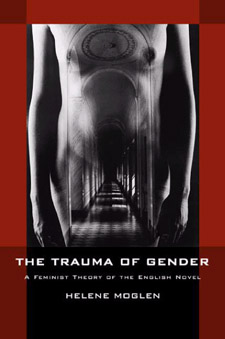 | Title: The trauma of gender: a feminist theory of the English novel Author: Moglen, Helene 1936- Published: University of California Press, 2001 Subjects: Literature | Gender Studies | Women's Studies | European Studies | European History | Literary Theory and Criticism | English Literature Publisher's Description: Helene Moglen offers a revisionary feminist argument about the origins, cultural function, and formal structure of the English novel. While most critics and historians have associated the novel's emergence and development with the burgeoning of capitalism and the rise of the middle classes, Moglen contends that the novel princi- pally came into being in order to manage the social and psychological strains of the modern sex-gender system. Rejecting the familiar claim that realism represents the novel's dominant tradition, she shows that, from its inception in the eighteenth century, the English novel has contained both realistic and fantastic narratives, which compete for primacy within individual texts. [brief] Similar Items |